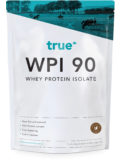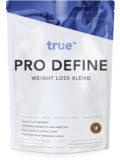Introducing SUPER C
SUPER C is an innovative new supplement designed to enhance the body's ability to cope with the effects of fatigue, stress and illness. Boasting scientifically supported doses of vitamins, nutrients and amino acids, SUPER C supports the body to reduce inflammation, maintain healthy immune function and improve collagen synthesis. This makes it ideal for times when your body is under additional stress from exercise, lack of sleep or the demands of everyday life. It is also useful to keep your immune system functioning at a healthy level during times where you might be exposed to more viruses, such as cold and flu season.
Key Points
-
Super C is not intended to be a soul source of nutrition and should be combined with a balanced diet, adequate sleep, stress management and exercise for best results
-
The key amino acids and minerals in SUPER C reduce the incidence of infection and reduce the severity of cold and flu symptoms once they have developed
-
Collagen is rich in amino acids and encourages healthy cell reproduction, which promotes a wealth of health benefits. Amino acids assist the body with carrying out countless vital physiological functions, including regulating your immune system.
-
Glutamine is a conditionally essential amino acid - meaning your body’s ability to produce it is comprised at times of illness or stress in the body, and it must be consumed in the diet. As an important amino acid for immune defence, it can be particularly useful to supplement glutamine during illness.
-
Vitamin C is one of the most extensively studied vitamins in regards to its effects on common cold and flu symptoms
-
Recent studies have shown that a 75mg/day dose of zinc taken within 24 hours of the onset and throughout the duration of respiratory virus symptoms reduced the duration of the illness.
-
Vitamin D3 plays an important role in enhancing immunity through the induction of antimicrobial proteins
Can A Supplement Really Help Me?
There is evidence to support the use of certain supplements to help ward off Upper Respiratory Tract Infections (URTIs)/cold/flu and also to assist in reducing the signs and symptoms once an infection has occurred. It is important to remember that during winter (which is traditionally the flu season) URIT’s and their symptoms are quite common.
Collagen
Collagen is one of the most abundant proteins in the body. It is responsible for building bone, muscle, joints, tendons, ligaments and skin. There are several forms of collagen - True use’s type I & III in SUPER-C. True sources hydrolyzed collagen derived from grass-fed cows in Argentina. Collagen is included in the complex as vitamin C is crucial for the production of collagen, as well as improving collagen synthesis when supplemented (1,2). The 5g of hydrolyzed collagen per serve in SUPER C provides the minimum effective dose for improving tendon and skin collagen synthesis when taken twice daily. A multitude of research supports the notion of consuming hydrolyzed collagen to enhance skin elasticity, improve hydration, reduce wrinkles and increase dermal collagen density(3,4). Though collagen supplementation is not directly associated with reduced incidence of illness, it was included in the complex because of the synergistic factor of vitamin C and its additional benefits to your body as the consumer.
Glutamine
Glutamine is a conditionally essential amino acid. This means that it needs to be consumed through the diet when a deficiency exists in the body. In normal circumstances, your usual diet will account for between 4-7g of glutamine per day. During periods of high stress and illness, the body’s natural stores of glutamine become depleted as glutamine is utilised to improve immune function. It is beneficial to the body to supplement the diet with additional glutamine to ensure optimum levels. Before supplementing takes place, it is recommended to consume foods that contain glutamine as part of your diet. You will notice that most meat and animal products contain moderate levels while whey and casein protein contain very high levels of glutamine. This is part of the reason that a high protein diet supported with those particular supplements is recommended as part of maintaining a healthy immune system (5).
Foods to consider to obtain GLUTAMINE
Glutamine is crucial to gut health too, as the cells of the gut wall and intestines preferentially utilise glutamine as a fuel source. With the current explosion in research linking the gut microbiome and its role in immune health, it is prudent to ensure your gut health is optimal. Glutamine is a regulator of “intestinal tight junctions”. These junctions are what are implicated in “leaky gut syndrome” have been proposed as possible sources of disease due to the ability of larger proteins to pass through the junctions and create inflammation(6). So if you are stressed, sick or performing a lot of endurance-based exercise, glutamine is an amino acid critical to include in your diet and supplementation routine. The upper level of glutamine supplementation intake is recommended at 14g per day (7). Levels above 50g/day have not been shown to have any adverse effects - although long term supplementation of this amount has not been researched to date, so it is not recommended to exceed this dose.
Zinc
Zinc is an essential mineral that plays a pivotal role in antioxidant enzymes, the immune system and brain activity. Zinc can and should be obtained through your diet. Many foods contain zinc and they are some of the most readily available types of food to consume.
Foods to consider to obtain ZINC
Zinc’s role in reducing the frequency of illness is well documented in research, along with its ability to support optimal levels of testosterone (a bonus feature). A recent meta-analysis showed that consuming a 75mg/day zinc supplement (lozenge) reduced URTI duration by approximately 3 days (33%) when taken < 24 h after the onset of symptoms, and for the duration of the illness (8,9). This is a significant amount of time being ill that could be reduced through zinc supplementation. It is also important to note that zinc is one such mineral that is lost during sweating. If you are exercising frequently and sweating a lot, this is something to be wary of.
In the formulation of SUPER C, we purposefully reduced the amount of zinc per serve to 15mg as we are aware that many of our customers consume our ZMA product (which contains 30mg per serve). If you are taking ZMA concurrently, we would recommend no more than three serves of SUPER C per day when suffering from symptoms of a cold/flu. If you are not taking ZMA, you can have up to four servings per day (read Vitamin C section first). Please note you may experience a metallic taste in the mouth from the zinc - this is completely normal. If you do experience any nausea it may be because you are taking too much and need to reduce your intake for the day.

Vitamin C
Vitamin C is an essential vitamin with antioxidant properties. We cannot synthesize it in our bodies, meaning we need to consume it in our diet in order to meet our nutritional requirements (8). Vitamin C deficiency is rare in today’s society and modern diet, but extreme cases of deficiency can result in scurvy. It should also be highlighted that Vitamin C deficiency is associated with smokers, heart disease, diabetes and other chronic diseases. What is not quite clear is whether or not these disease states cause vitamin C deficiency, or whether vitamin C deficiency contributes to the disease state.
Vitamin C is a water-soluble vitamin that is commonly supplemented when flu-like symptoms occur. The severity and duration of colds have been found to be reduced in adults and children taking doses of vitamin C in the 1000mg-4000mg/day once symptoms have begun (8, 10, 11). There appears to be a dose-dependent benefit of vitamin C once symptoms have commenced, with research trials investigating 3 g/day and 6 g/day of Vitamin C showing a clear benefit in reducing the duration of the cold and its symptoms (8,10,11). This is not to say that you should immediately start with a super-sized dose of vitamin C, as it can result in some gastrointestinal issues such as cramping and diarrhoea when taken in high doses too quickly. It is recommended to start with two-three servings per day once symptoms have begun and then increase the daily number of serves up to a maximum of four serves per day. This should limit the risk of any GI issues related to the Vitamin C dose. It is advised that high doses of vitamin C be limited to the duration of the symptoms of the URTI/cold/flu. After this time, a lower dose (one serve of SUPER C) can be continued daily with no issues. The purpose of this supplement is to provide a high dose of the key ingredients when symptoms are present - it is not recommended to take these high doses on a regular basis as this is not warranted.
Vitamin C is found in many fruits and vegetables, all of which should be consumed every day in order to receive the benefit of vitamin C as well as all the other micronutrients present in these foods. A balanced, wholefood diet is always the first recommendation when it comes to good health and immune function - nutritional deficiencies are not something you want to be addressing during a time of illness!
Foods to consider to obtain VITAMIN C
Vitamin D3
Vitamin D is a fat-soluble vitamin and is considered to be critical for human survival. The key source of vitamin D for people is through sunlight.. It is recommended that you get at least 15 minutes of full exposure to the sun each day. This means maximum skin exposed with no sunglasses and no sunscreen applied. It is best to do this in the morning to avoid overexposure to UV rays.
The benefits of vitamin D are wide and include improved bone health and reduced fracture risk, skeletal muscle repair and remodelling, improved cardiac function, being critical to innate immunity and also enhancing an individual's immunity via anti-inflammatory pathways. What we know is that circulating levels of vitamin D regulate immune cells such as macrophages, neutrophils and lymphocytes - therefore these functions are regulated by your Vitamin D status (12,13).
There are two types of Vitamin D that can be supplemented, and it is recommended that D3 (Cholecalciferol) be used over D2 (Ergocalciferol) (13). In order to best understand your current vitamin D3 level, it is recommended that you have it included in your routine blood test. It is generally recommended that these be performed twice per year, preferably at the end of summer to check your levels and assess if any supplementation is required during winter. The second test would be performed either 6-8 weeks after the first test (to address the efficacy of any supplementation that has been added to address deficiencies) or nearing the end of winter. Because vitamin D is a fat-soluble vitamin, it means that it is able to be stored in the body within your fat and liver. It is advised to consume your vitamin D supplement with a small to moderate amount of healthy fat in the morning (for example with one-two eggs or half an avocado).
A recent analysis recommended 1000 IU/day of vitamin D3 from autumn-spring to maintain sufficiency, and that supplementation up to 4000IU/day could be required for certain individuals (depending on their Vitamin D3 status) (8, 14). With the onset of the cooler months in Australia and the inevitable uncertainty of your actual level of circulating Vitamin D3 (due to lack of testing), it is a safe bet to supplement with a minimum of 1000IU/day (and up to 4000 IU/day) to ensure levels do not drop into deficiency or insufficiency.
What else to consider when attempting to reduce the risk of sickness?
Though supplements can help to fill nutritional gaps, they are not a shortcut to good health and strong immunity. Take the time to prioritise the steps consistently recommended by doctors and dietitians all over the world: a healthy diet, adequate sleep and exercise come first and foremost when looking to build natural immunity. Combine these with SUPER C and the steps below and you are sure to be on the right track to protecting your overall health and immunity.
-
Eat a high protein diet: A diet higher in protein has been shown to assist with improved immune function. As outlined by the 2007 British Journal of Nutrition, "a deficiency of dietary protein or amino acids has long been known to impair immune function and increase the susceptibility of animals and humans to infectious disease." (15)
-
Sleep well: Ensure you are getting plenty of sleep - this when you recover and repair, ensuring your immune system is firing. Aim to get seven-nine hours per night. Evidence shows that getting less than six hours of sleep per night will increase your risk of illness(16). If you want to take your understanding of your sleep to the next level, you can invest in a gadget like the Oura Ring. The level of detail it provides for sleep and recovery is outstanding and can provide some useful personalised insights.
-
Destress where possible: The demands of modern life can mean you’re constantly under stress. Try meditating, yoga or stretching on your own to assist this. Stress will compromise your immune system and weaken your response to any virus.
-
Avoid binge drinking alcohol: Everyone loves a drink - but it is important to remember to keep the consumption of alcohol moderate (if at all). Binge drinking will have several runoff effects on sleep performance, immune system robustness, motivation and stress. Try to avoid it completely if possible.
-
Limit contact with sick people: If you come into close contact with a person who is ill then it is likely you will become infected. Try and limit close contact with potentially ill people, and always stay home if you feel unwell.
References
- Padayatty, S J, and M Levine. “Vitamin C: the known and the unknown and Goldilocks.” Oral diseases vol. 22,6 (2016): 463-93.
- Kivirikko KI, Myllylä R. Post-translational processing of procollagens. Ann N Y Acad Sci. 1985; 460():187-201.
- Choi et al, 2019. Oral Collagen Supplementation: A Systematic Review of Dermatological Applications Jan 2019;18:1
- Jhawar et al,2019 . J Cosmet Dermatol. Oral collagen supplementation for skin aging: A fad or the future? 2019;00:1–3.
- Lenders, C M et al. “Evaluation of a novel food composition database that includes glutamine and other amino acids derived from gene sequencing data.” European journal of clinical nutrition vol. 63,12 (2009): 1433-9.
- Eur J Clin Nutr (2009)Li N, et al. Glutamine regulates Caco-2 cell tight junction proteins.Am J Physiol Gastrointest Liver Physiol. 2004 Sep;287(3)
- Shao A1, Hathcock JN.Risk assessment for the amino acids taurine, L-glutamine and L-arginine. Regul Toxicol Pharmacol. 2008 Apr;50(3):376-99.
- Am J Physiol Gastrointest Liver Physiol (2004)Walsh, Neil P. “Nutrition and Athlete Immune Health: New Perspectives on an Old Paradigm.” Sports medicine (Auckland, N.Z.) vol. 49,Suppl 2 (2019): 153-168.
- Zinc for the common cold. Cochrane Systematic Review - Intervention Version published: 18 June 2013
- Vitamin C for preventing and treating the common cold. Cochrane Systematic Review- Intervention Version published: 31 January 2013
- Karlowski et al.. Ascorbic acid for the common cold. A prophylactic and therapeutic trial.JAMA. 1975 Mar 10; 231(10):1038-42.
- Martineau, Adrian R et al. “Vitamin D supplementation to prevent acute respiratory tract infections: systematic review and meta-analysis of individual participant data.” BMJ (Clinical research ed.) vol. 356 i6583. 15 Feb. 2017.
- Owens, Daniel J et al. “Vitamin D and the Athlete: Current Perspectives and New Challenges.” Sports medicine (Auckland, N.Z.) vol. 48,Suppl 1 (2018): 3-16.
- Tripkovic, Laura et al. “Comparison of vitamin D2 and vitamin D3 supplementation in raising serum 25-hydroxyvitamin D status: a systematic review and meta-analysis.” The American journal of clinical nutrition vol. 95,6 (2012): 1357-64.
- Li, P., Yin, Y., Li, D., Woo Kim, S., & Wu, G. (2007). Amino acids and immune function. British Journal of Nutrition, 98(2), 237-252.
- Wentz et al. (2018). Increased Risk of Upper Respiratory Infection in Military Recruits Who Report Sleeping Less Than 6 h per night. Mil Med. Nov 1; 183(11-12)










 Meal Preps
Meal Preps
 Nutrition Tips
Nutrition Tips
 Exercise
Exercise
 News & Updates
News & Updates
 Lifestyle
Lifestyle






Leave a comment